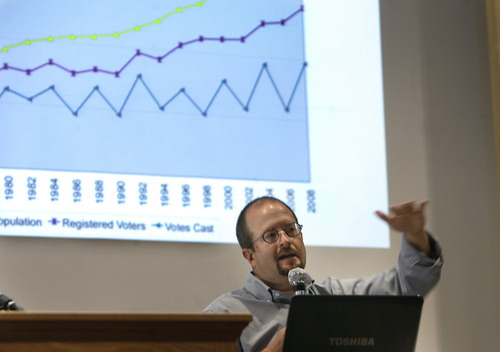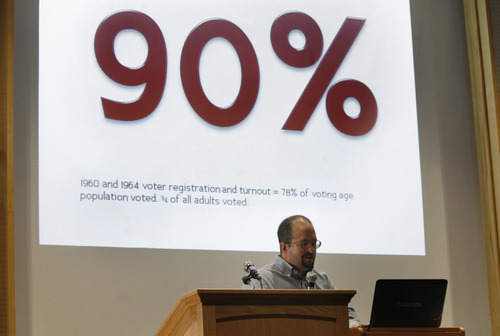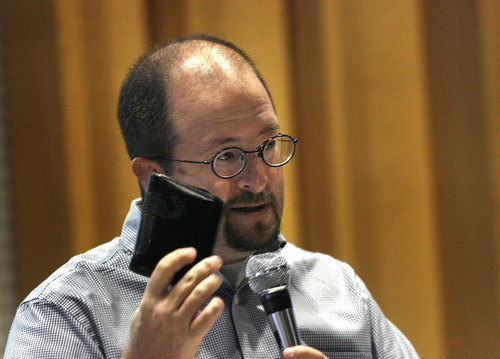This is an archived article that was published on sltrib.com in 2012, and information in the article may be outdated. It is provided only for personal research purposes and may not be reprinted.
Mormon apostles routinely remind their flock that voting isn't just a right, it's a righteous obligation — and now there's evidence that these leaders largely practice what they preach.
Top leaders of The Church of Jesus Christ of Latter-day Saints are registered to vote, and a high percentage of them do so, even in years without a presidential campaign, according to a just-completed survey by Aaron Campbell, a marketing and campaign consultant in Utah County.
Campbell presented his findings Saturday on the final day of the Sunstone Symposium, an annual meeting of Mormon intellectuals.
Campbell first offered a historic overview of Utah's voting patterns from statehood in 1896 until the present, noting the occasional political party switching and various events that turned voters in one direction or another.
He took special note that in 1960 and 1964, 90 percent of Utah's available adult population was registered to vote, and 90 percent of those did vote. As the population grew and added 18-year-olds, however, the gap widened between those who were registered and who actually went to the polls.
Campbell looked specifically at Orem, a place with a high density of Mormons, and its voting patterns during recent years. In a massive data project that required multiple cross-checks, he researched LDS bishops, stake presidents, active and less-active members and nonmembers, matching names to voter registrations and votes recorded.
Of 21 Orem LDS stake presidents, 100 percent are registered voters, and all of them voted in 2008, the year Barack Obama was elected president. In the off-years of 2009 and 2011, these stake presidents voted 52 percent and 38 percent, respectively. In 2010, however, the year Sen. Bob Bennett was defeated by Mike Lee at the Republican Convention, 95 percent of them voted in the general election.
In the same time periods, 88 percent of 180 Orem bishops were registered voters, Campbell discovered, and 95 percent of them voted in 2008. Only 41 percent of the registered voter bishops voted in 2009, 85 percent in 2010, and 47 percent in 2011.
In 2011, 87 percent of the whole Orem population was registered, but only 16 percent voted. That means local elections were decided by fewer than 10 percent of the eligible voters, Campbell noted. "That leaves a lot of power in the hands of a few."
Between 2004 and 2008, voter turnout took a dramatic turn downward. In 2004, Campbell said, the total voter population turnout was 67 percent, the 11th highest in the country; four years later it was 49 percent, the second lowest in the nation after Hawaii. In 2010, a nonpresidential year, it was 38 percent, third lowest in the country.
Among those Americans who aren't registered, the census showed that an average of 46 percent said they weren't interested and 3 percent said their vote wouldn't make a difference. In Utah, Campbell's own survey revealed that 32 percent said they weren't interested, while 15 percent (five times the national figure) said it wouldn't make a difference.
Overall, many more people vote during a presidential election year, and that is certainly true in Utah. Still, only 50 percent of registered Utah voters (59 percent of the total population) voted in 2008, the year Obama was elected.
In the off-years, the voting record is dismal everywhere, including Utah. In 2010, for example, only 38 percent of the registered voters (61 percent of the population) made it to the polls. That means only about 20 percent of the population elected Lee. Such low voter numbers, in turn, give a lot of the power to party activists, who go to their neighborhood caucuses or work for local campaigns, Campbell said. In 2011, for example, 65 percent of the Orem voters were registered, but only 16 percent of those actually voted, Campbell said.
Campbell broke down the Orem numbers among active Mormons, less-active Mormons and non-Mormons. Of the 45 percent non-Mormon registered voters, 88 percent voted in the 2008 presidential election, while none voted in 2009, where the slate of choices were mostly for local offices. "Can you blame them?" Campbell quipped.
Earlier this year, the LDS First Presidency canceled all meetings on the night of the Republican and Democratic caucuses and urged all church members to go to their neighborhood meetings, he said. As a result, many more citizens got involved, which likely altered the outcome at the party conventions.
"If you eliminate the caucus system and allow same-day voter registration," he said, "it would change the face of Utah politics and give voters more control and a sense of empowerment."
Utah total voter turnout
2004 • 67 percent in the presidential election, 11th-highest turnout in nation
2006 • 36.7%, last in nation
2008 • 49% in presidential election, second to last in the country
2010 • 38%, third lowest in the country —
LDS members' civic duty
"The civic duty of any Latter-day Saint, regardless of where they live, or including any county they may live in, is to be actively involved in the political process — meaning that they study the issues, they determine what the needs are as they see it, that they then use their freedom and their agency to vote according to their own conscience. It's very important that good people everywhere are involved in this process."
Elder M. Russell Ballard, 2012







